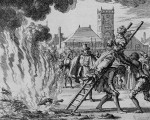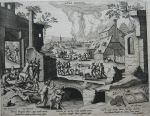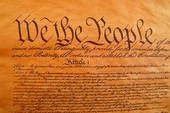The creation of the idea of separation of church and state, arguably one of the most important innovations in government, has many roots. Most people tend to know only of the secular root. However there is also a religious root to this idea, a root that goes as deep if not deeper into time than does the secular, and which actually came to full fruition before the secular one did.
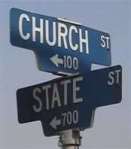
Most people, both religious and secular, are surprised upon finding this out. I know I was when I found out. However, upon a little reflection, what is really surprising is that Americans are surprised that Christian thought can lead to the separation of church and state, since most Americans are also already aware of one of the primary Biblical arguments for the separation of church and state.
17 Tell us then, what is your opinion? Is it right to pay the imperial tax to Caesar or not?”
18 But Jesus, knowing their evil intent, said, “You hypocrites, why are you trying to trap me? 19 Show me the coin used for paying the tax.” They brought him a denarius, 20 and he asked them, “Whose image is this? And whose inscription?”
21 “Caesar’s,” they replied.
Then he said to them, “So give back to Caesar what is Caesar’s, and to God what is God’s.”
Matthew 22:17 – 21
Although I quoted from Matthew, the same story appears in Mark and Luke also. So, within the Gospels, from the mouth of Jesus, there is already Biblical support for the idea that there are two separate spheres – the church and the state. However, within the Bible, these verses are not the only ones cited for support of this idea of two separate spheres – or domains, kingdoms, swords, or a host of other terms for this idea. The Old Testament was also often cited as support for this idea.
For example, Exodus 18: 13-26 and Exodus 28:1 are cited as showing that the position of civil magistrate and that of priest are created separately, demonstrating, again, the existence of two separate domains. Jehoshaphat, the righteous king of Judah, is another example that was often cited. In 2 Chronicles 19:11 Jehoshaphat appointed one man to administer to matters “concerning the LORD” and another man to matters “concerning the king”.
11 “Amariah the chief priest will be over you in any matter concerning the Lord, and Zebadiah son of Ishmael, the leader of the tribe of Judah, will be over you in any matter concerning the king, and the Levites will serve as officials before you. Act with courage, and may the Lord be with those who do well.”
Several other verses and examples were also used to support the idea that there are two different domains, one of civil government and one of the church.
Now, let me state here, that this is not separation of church and state yet. However, it is the beginnings of it. It is a recognition that the church does not control all and that the civil government does not control all – each has their own domain. Without this basic concept there can be no separation of church and state.
And lest you wonder if this is a reading backwards from today’s views about church and state and imposing those views to the past, this doctrine of separate spheres of authority was introduced by Saint Augustine (354 – 430 CE) in his book City of God. From the Stanford Encyclopedia of Philosophy,
A distinction between Church and State—more exactly, between the priesthood and the power of the emperor, each independent in its own sphere, though the priesthood has the higher function. The classic place for this doctrine is the canon Duo sunt. Another canon, Cum ad verum, gave reasons for the separation: mutual limitation of their powers would restrain the pride of priest and emperor, and those on God’s service (the clergy) should be kept free of worldly entanglements. This was also the force of the canons Sicut enim and Te quidem.
Just as a quick aside for those who do not think religion had anything to do with modern rights and freedoms, you might like to read more of this link than just the part I quoted. Augustine also argues that the source of political power lies in the people who have then entrusted this power to kings and emperors. Further he advances an argument for the natural rights of all men as well as a belief that all men are equal and because of this slavery was contrary to natural law. Both ideas sound strikingly familiar to what later, secular, enlightenment philosophers would argue.
Getting back to the separation of church and state now, these ideas and arguments of Augustine were then developed by Pope Gelasius (Pope from 492 – 496 CE) into an explicit political statement.
“Writing to Anastasius, emperor in the east, Gelasisu stated, ‘There are, then, august Emperor, two powers by which the world is chiefly ruled, the sacred power of the prelates and the royal power. ‘”
Spheres of Sovereignty by Robert Joseph Renaud and Lael Daniel Weinberger in the Northern Kentucky Law Review.
So, the theory of two separate spheres has existed since very early in church history. Theoretically these should be co-equal, each having total and complete dominion over their area. However, as is usual, theory tends to get bent and broken upon meeting reality. The reality is that there were times  when the church was dominant and ruled over civil matters. There were other times when the state was dominant and ruled on church matters. This varied dependent on various political and social factors.
when the church was dominant and ruled over civil matters. There were other times when the state was dominant and ruled on church matters. This varied dependent on various political and social factors.
In fact, in the 11th century Pope Gregory VII morphed this doctrine into one of papal supremacy. Pope Innocent III followed up by adding what had formerly been one of the emperor’s titles to his own, that of “Vicarius Dei”. Pope Boniface VII openly declared that both spiritual and temporal power were under the pope, with temporal only being on loan, so to speak, from the pope. In other words, while they were two separate spheres, the spiritual reigned over the civil, which was a modification of what had been originally understood.
It will probably surprise many to find that the Protestant Reformers also made this distinction between the two spheres. John Calvin for one, despite his reputation and his actions in Geneva, believed in the separate jurisdictions of church and state.
“Calvin believed in an independent church supported and reinforced by a godly civil magistrate. In this we see hints of a blending of roles, where church and state cooperate to maintain purity. This is what most observers think of first when they think of Calvin’s contributions to church-state relations. But what is often missed is that even when Calvin speaks of the cooperation of church and state, eh does not speak of the subordination of one to the other. Calvin believed that the church and state coexisted as two forms of government separated from one another by God, but both under God and subject to his law-word….An example given in the Institutes illustrates what Calvin meant by this:
Does any one get intoxicated. In a well ordered city his punishment will be imprisonment. Has he committed whoredom? The punishment will be…more severe. Thus satisfaction will be given to the [civil] laws, the magistrates, and the external tribunal. But the consequence will be, that the offender will give no signs of repentance, but will rather fret and murmur. Will the Church not here interfere?
Spheres of Sovereignty by Robert Joseph Renaud and Lael Daniel Weinberger in the Northern Kentucky Law Review.
Here is another quote from Calvin about the relationship between church and state, again from Institutes:
Some…are led astray, by not observing the distinction and dissimilarity between ecclesiastical and civil power. For the Church has not the right of the sword to punish or restrain, has no power to coerce, no prison nor other punishments which the magistrate is wont to inflict. Then the object in view is not to punish the sinner against his will, but to obtain a profession of penitence by voluntary chastisement. The two things, the fore, are widely different because neither does the Church assume anything to herself which is proper to the magistrate, nor is the magistrate competent to what is done by the Church.
Although not exactly the same, Luther’s views of church and state paralleled that of Calvin; Luther saw two realms, the church and state, both under God but each being institutional equals. James Madison, one of the principle creators of our Constitution, the creator of our Bill of Rights, and one of the staunchest proponents of church/state separation, acknowledged that this idea of the two being separated came from religious sources first. In a letter to F. L. Schaeffer dated Dec 3rd, 1821, Madison writes that, “It illustrates the excellence of a system which, by a due distinction, to which the genius and courage of Luther led the way, between what is due to Caesar and what is due to God, best promotes the discharge of both obligations.”
Although Madison does not say so, I believe that he is referring to Martin Luther’s book On Secular Authority. From this work:
God has ordained the two governments: the spiritual, which by the Holy Spirit under Christ makes Christians and pious people; and the secular, which restrains the unchristian and wicked so that they are obliged to keep the peace outwardly…The laws of worldly government extend no farther than to life and property and what is external upon earth. For over the soul God can and will let no one rule but himself. Therefore, where temporal power presumes to prescribe laws for the soul, it encroaches upon God’s government and only misleads and destroys souls. We desire to make this so clear that every one shall grasp it, and that the princes and bishops may see what fools they are when they seek to coerce the people with their laws and commandments into believing one thing or another.
And later in the book,
We are to be subject to governmental power and do what it bids, as long as it does not bind our conscience but legislates only concerning outward matters…But if it invades the spiritual domain and constrains the conscience, over which God only must preside and rule, we should not obey it at all but rather lose our necks. Temporal authority and government extend no further than to matters which are external and corporeal.
Surprisingly modern in its ideals about separation of church and state, however, this is still not there yet. That is because for the great majority, the church still has control over doctrine and what people should and should not believe. While believing that the state should have no power to determine and enforce religious belief, most did believe that the church had this power and that, as the guardian of men’s souls, had a responsibility to do so.
Further, many of the sects and denominations had no problem integrating the two domains; others could not resist the lure of having the state support the church. Nor could the state resist using the church in this way. So, the elements were in place for a modern understanding of the separation of church and state, it only needed someone to put it together and add the individual’s right to determine his own spiritual belief, without coercion from either church or state.
Now, there were many who started to piece this together and started to promote an ideal of separation that more closely approached our own. But in the interest of keeping this from getting too long, let me jump to the fruition of religious thought on separation of church and state, the writings and actions of Roger Williams.
Religious Argument for Separation of Church and State
Roger Williams, in his book The Bloody Tenet of Persecution, for Cause of Conscience, was the first person, either secular or religious, to forcefully argue for the total separation of church from state. Being a  Protestant Theologian, a Puritan, and the founder of the Baptist church in America (although he did not stay a Baptist for long), his arguments were, of course, religious; building on all the elements I mentioned above, from the Bible and the works of such men as Luther and Calvin. What is even more important, he did not just talk the talk, but he walked the talk too. To all of this he also added in his own critical look at both the current state of affairs and recent history.
Protestant Theologian, a Puritan, and the founder of the Baptist church in America (although he did not stay a Baptist for long), his arguments were, of course, religious; building on all the elements I mentioned above, from the Bible and the works of such men as Luther and Calvin. What is even more important, he did not just talk the talk, but he walked the talk too. To all of this he also added in his own critical look at both the current state of affairs and recent history.
Williams was also the founder of Rhode Island, and he managed to convince King Charles to let him set it up along his principles as set out in The Bloody Tenet. Rhode Island thus had the first government in which state and government were fully separated; a much more thorough separation than ours is today. And this was well before a similar secular case was made for the separation of church and state. Williams founded Rhode Island in 1636. The Bloody Tenet was published in 1644. John Locke, widely considered the chief proponent of the secular argument for the separation of church and state, was born in 1632. In fact, John Locke was influenced by the religious arguments for the separation of church and state, either directly through Williams or indirectly through John Milton, who knew Williams and was much influenced by him.
Williams agreed with Augustine, Calvin, Luther and the others that the civil magistrate had no power and jurisdiction on matters of faith, belief and the church. Where Williams disagreed with most of his fellow Christians though, is that he extended this to the church, parting company with them on the power of the church over individual beliefs, the power or the church to enforce doctrine and beliefs, and over the link between the state in supporting one religion over another. He believed that the church, far from being an instrument of God was a creation of man, and thus flawed. After all, there is plenty of Biblical support for this – view the Bible’s condemnation of the religious institutions of their times in both the Old and New Testament, how they all fall short – as well as historical support in the form of religious wars, religious persecution, and competing doctrines.
From an article on the Smithsonian site:
Williams’ main purpose was to prove, “It is the will and command of God that, since the coming of his Sonne the Lord Jesus, a permission of the most Paganish, Jewish, Turkish, or Antichristian consciences and worships, bee granted to all men in all Nations and Countries.” Over hundreds of pages he lays out his case, expanding upon his view that the state will inevitably corrupt the church, rebutting Scriptural arguments for intolerance with Scriptural arguments for tolerance.
Then he countered the almost universally held view that governments received their authority from God, and that in the material world God favored those who were godly and punished those who were not. If it were that simple, then why did He subject Job to such an ordeal? And Williams noted that at that very moment in European conflicts, Catholics had “victory and dominion.” If “successe be the measure,” then the evidence proved that God had chosen Catholics over Protestants.
What caused Williams to make this next step was his understanding of his religion, both of the Bible and theology, and his critical examination of the world he lived in. At that time religious wars and persecutions were common, and often bloody. Williams had himself been persecuted for his beliefs, both in England and in America. There were numerous varieties of Christianity, all claiming to be doing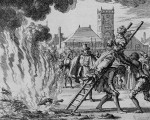 what God wills. Given that this was not possible, then there was something wrong with the idea that the Church had been entrusted by God to keep men from straying. Roger Williams identified that wrongness by use of standard Christian theology. Man was a sinful and fallen creature living in a sinful and fallen world. That means that all of the institutions he created, both secular AND religious would be flawed and imperfect.
what God wills. Given that this was not possible, then there was something wrong with the idea that the Church had been entrusted by God to keep men from straying. Roger Williams identified that wrongness by use of standard Christian theology. Man was a sinful and fallen creature living in a sinful and fallen world. That means that all of the institutions he created, both secular AND religious would be flawed and imperfect.
Further, one could never be certain of anyone else’s salvation other than one’s own. God and God alone is the final judge. Given the flawed nature of man, no man is going to be correct all the time, and their judgment on another’s soul could well be in error. Given this, then best to let that be between the individual and God. He believed that only individuals could be redeemed, not nations, not institutions, but individuals. So there was no such thing as a Christian nation or Christian school, only Christian individuals.
Taking this even further, if one could never be certain about the state of another person’s soul, and if all persons and all human institutions are flawed, then should any institution try to force another to believe against their conscience? What if the Puritan church were wrong and had forced people for all of its years of existence to believe wrongly. Now, all of those souls damnation was their fault. Far better to let each person choose to believe as they wished, to relegate all conversion attempts to words only and not to government strictures and force; “The civil sword may make a nation of hypocrites and anti-Christians, but not one Christian”. In fact, this extends not only to those professing to be Christian but to all of humanity. Jew, Muslim, Catholic, Quaker, Atheist…. all.
I would like to point out that Roger Williams separation of church and state was even more absolute than that of John Locke’s. Locke would have limited the freedoms of conscience for Catholics and atheists (although he did later back of outlawing atheism). Williams allowed all of whatever faith or of none to enjoy full civil and personal liberties.
Further, building upon the thoughts of Augustine (that I had earlier briefly alluded to) and other theologians about human rights and the source of political power, “I infer that the sovereign, original, and foundation of civil power lies in the people.” The governments they establish, he wrote, “have no more power, nor for no longer time, than the civil power or people consenting and agreeing shall betrust them with.”
So, far from being a purely secular ideal, the separation of church and state came first from religious thought, with the goal of preserving the integrity of both the church and of the individual believer, and then influenced the secular thinkers to argue the same, but from the view of the benefits such an ideal provided to the state, and also the individual.
While it is easily understandable why secularists today might have forgotten this history, being focused on the secular, Enlightenment thinkers who directly influenced the men creating the first nation with separation of church and state and ignoring those who came before them; but it is truly a shame that so many Christians have forgotten this important part of history too. The separation of church and state is one of those areas where there are both good religious and good secular reasons for not only maintaining, but jealously guarding. It is an institution that protects both the state and the church and, most importantly of all, the individual.
Read Full Post »




 So, who do I think is the most persecuted religion? The Jews. They have been persecuted for far longer than Christians have, have suffered more deaths and restrictions than Christians have. What is of interest here is that the Jews have suffered deaths and restrictions frequently at the hands of Christians. In fact, this makes me wonder, does the fact that Christians persecuted other religions mean that they should be deducted points for most persecuted religion? This question is especially important in light of the fact that the religion that has engaged in the greatest amount of persecution of the Jews is Christianity.
So, who do I think is the most persecuted religion? The Jews. They have been persecuted for far longer than Christians have, have suffered more deaths and restrictions than Christians have. What is of interest here is that the Jews have suffered deaths and restrictions frequently at the hands of Christians. In fact, this makes me wonder, does the fact that Christians persecuted other religions mean that they should be deducted points for most persecuted religion? This question is especially important in light of the fact that the religion that has engaged in the greatest amount of persecution of the Jews is Christianity. Yes, Islam has done so too. Both have anti-Semitic elements within their respective sacred books. However, for most of history,
Yes, Islam has done so too. Both have anti-Semitic elements within their respective sacred books. However, for most of history, Islamic countries have been a safer place for Jews to live than Christian European ones. That is not to say that Jews were considered the equals of Muslims, nor that they did not suffer persecutions and extra taxations . They did. However, what the Jews experienced in Christian Europe was worse, on average, than what they experienced in the Middle East. Just consider, the greatest number of Jews being killed for being Jewish occurred during the First Crusade and in Nazi Germany during the Holocaust. Both of these were Christian countries and these actions carried out by Christians.
Islamic countries have been a safer place for Jews to live than Christian European ones. That is not to say that Jews were considered the equals of Muslims, nor that they did not suffer persecutions and extra taxations . They did. However, what the Jews experienced in Christian Europe was worse, on average, than what they experienced in the Middle East. Just consider, the greatest number of Jews being killed for being Jewish occurred during the First Crusade and in Nazi Germany during the Holocaust. Both of these were Christian countries and these actions carried out by Christians.




